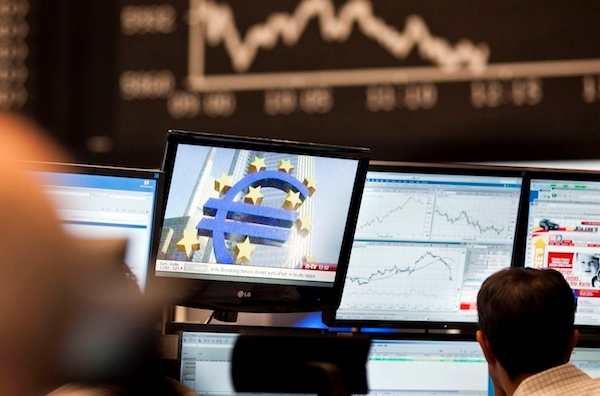Mario Draghi’s announcement yesterday that the ECB would ‘do whatever it takes’ to preserve the euro certainly cheered markets up – but only for a while.
Interest rates for Spanish 10-year bonds dropped below the danger threshold of 7 per cent and the euro gained two cents against the dollar. But the more eagle-eyed spotted that this only returned the state of play to where it was on Friday. Draghi’s words were designed as a hint to traders that the ECB was open to emergency support for Spanish and Italian bond markets.
But Reuters is now reporting that Spanish economy minister Luis de Guindos suggested in a meeting with German finance minister Wolfgang Schaeuble last Tuesday that Spain might need a full bailout worth €300 billion.
The Spanish government is denying that this conversation even took place or that there was a need for a full bailout. Schaeuble is understood to have dismissed the request in any case because the European Stability Mechanism bailout fund was not yet in place. If the reports are true, it would go some way to explaining Draghi’s intervention.
A full bailout would be enormously costly and talk of it will spook the markets. But Daniel Hannan argues in this week’s magazine that a ‘less calamitous’ route out of the country’s current recession would be for Spain to ‘default, decouple and devalue, pricing its way back into the market and exporting its way back to growth’. Don’t forget that Hannan predicted the shape of the current crisis when the currency union was being formed in 1998.
Investors are now waiting for Draghi to deliver on his ‘whatever it takes’ promise. He argued yesterday that ‘believe me, it will be enough’ to save the euro. The will to save the currency is still there, but the way to really do so is not yet clear, save for the current piecemeal approach and comforting words to soothe the markets.
UPDATE, 15.30: Angela Merkel and François Hollande have just issued this statement, which appears to endorse Draghi. They say that France and Germany are determined to do everything to protect the eurozone, but add that they reaffirmed in their talks today the importance of putting in place the conclusions of the European Council on 28 and 29 June.







Comments